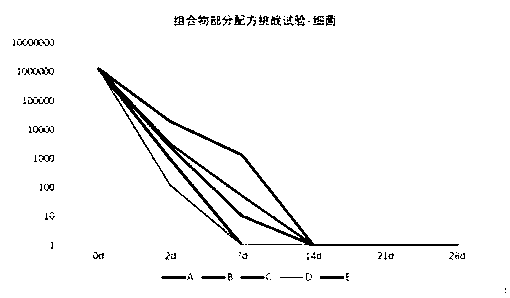Preparation method and application of epsilon-polylysine-containing antimicrobial composition
A polylysine, antimicrobial technology, applied in the field of antisepsis and antibacterial, can solve the problems of low usage, poor inhibitory effect, etc., and achieve the effect of low usage, small usage, and excellent inhibitory effect
- Summary
- Abstract
- Description
- Claims
- Application Information
AI Technical Summary
Problems solved by technology
Method used
Image
Examples
Embodiment 1
[0030] Each component content (weight %) of antimicrobial composition of table 1
[0031]
[0032]
[0033] Preparation method: In a 100mL three-neck bottle with stirring and thermometer, according to the content of each component in Table 1, add ε-PL and the ingredients in the solvent except water, stir and heat to 35-40°C, then add water, and maintain the corresponding temperature , stir and add the remaining antimicrobial ingredients, continue to stir until completely dissolved and then cool down to below 35°C to obtain a stable and transparent antimicrobial composition solution formula.
Embodiment 2
[0035] Investigate the cold resistance of part of the formula in Example 1, heat resistance, light stability, and compare with the product described in the reference document (publication number CN104958248A, a kind of biological antibacterial composition and its application in cosmetics), the results are shown in figure 1 , figure 2 ,Table 2.
[0036] Formulation stability of table 2 part
[0037]
[0038] figure 1 , figure 2 , Table 2 shows that the color of the composition formula does not change under light and high temperature conditions, and the content of the target active substance remains unchanged, while the color of the comparison product changes greatly under light and high temperature conditions, reflecting the combination of ε-PL in this description good stability of the material.
[0039] Compare Product Formula Combinations:
[0040] ε-PL 0.5%; nisin 0.1%; natamycin 0.4%; glycerol 5%; 1,3-butanediol 3%; caprylyl glycol 1%.
Embodiment 3
[0042] Anti-bacterial (inhibitory) test - minimum inhibitory concentration (MIC value) determination.
[0043] The minimum inhibitory concentration (MIC value) of some antimicrobial compositions and ε-PL in Table 1 was determined by the suspension method, and the results are shown in Table 3.
[0044] The minimum inhibitory concentration (MIC value) of some compositions in table 3
[0045]
[0046]
[0047] Table 3 shows the minimum inhibitory concentration of ε-PL single product and some composition formulations. It can be seen that the inhibitory effect of ε-PL on fungi is much different than that on bacteria, and the composition formulation contains ε-PL 10%-20% On the basis of compounding other varieties of antimicrobial agents, the MIC value converted to the pure product is still comparable to that of the single product. Taking formula 5# as an example, the MIC against Staphylococcus aureus is 500ppm, of which ε-PL The content is 20%, and the MIC value converted into...
PUM
 Login to View More
Login to View More Abstract
Description
Claims
Application Information
 Login to View More
Login to View More - R&D
- Intellectual Property
- Life Sciences
- Materials
- Tech Scout
- Unparalleled Data Quality
- Higher Quality Content
- 60% Fewer Hallucinations
Browse by: Latest US Patents, China's latest patents, Technical Efficacy Thesaurus, Application Domain, Technology Topic, Popular Technical Reports.
© 2025 PatSnap. All rights reserved.Legal|Privacy policy|Modern Slavery Act Transparency Statement|Sitemap|About US| Contact US: help@patsnap.com



